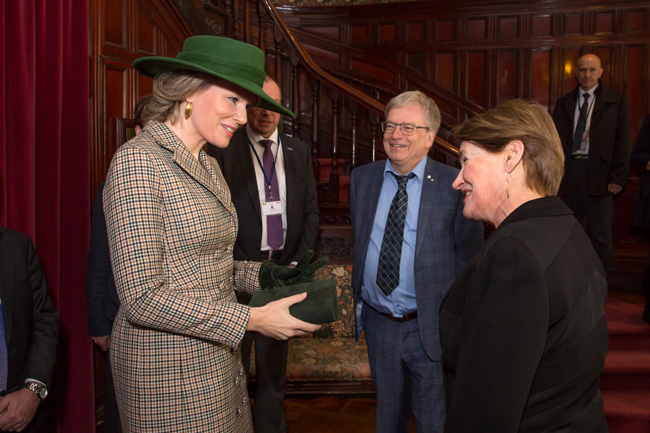
On Friday, March 16, McGill was graced by a royal visit, when Her Majesty the Queen of the Belgians was the honoured guest at a special lunch at the Faculty Club.
The visit came on the second-to-last day of a week-long Belgian state visit to Canada. Their Majesties King Philippe and Queen Mathilde participate in only one State visit to each country during their reign and this was the first Belgian state visit to Canada in 40 years.
Their Majesties led a Belgian delegation that included political, business and academic representatives. The purpose of the state visit was to consolidate and develop economic and scientific ties between Belgium and Canada, with a specific focus on younger generations of researchers, innovators and industry leaders.
The lunch was a follow-up to a research seminar organized earlier that day at the Fairmont Queen Elizabeth Hotel by three granting agencies: Fonds de la Recherche Scientifique (FRS) – Fonds National de la Recherche Scientifique (FNRS) and the Research Foundation – Flanders (FWO) from Belgium, and the Fonds de Recherche du Québec (FRQ). The seminar addressed fundamental research developments in Belgium and Quebec and highlighted bilateral collaborations supported by the three research funds.
In welcoming Her Majesty the Queen and the Belgian delegation, Principal Suzanne Fortier emphasized the growing importance of collaboration between McGill and Belgian universities and research institutions.
“As we strengthen our bilateral relationships, our universities are collaborating in a growing number of innovative projects,” said Principal Fortier. “By bringing together our best and brightest researchers and students, we will be able to best respond to the pressing issues of the day,” she said.
The Principal referred to a pair of joint scientific workshops hosted by McGill during the state visit. The first focused on social suffering in the globalized world and included researchers from McGill, Ghent University, Katholieke Universiteit Leuven and the SHERPA Research Center in Montreal. Participants addressed the determinants of sympathy for youth radicalization and the challenge of transition for refugee children.
In the second workshop, McGill, Ghent University and Université de Laval discussed current and future joint research projects in resource recovery, including phosphate capture and recovery; low carbon footprint wastewater facilities; and the circular nutrient economy.
The Belgian visit was the most recent meeting between McGill and other universities from around the world – with the goal of establishing partnerships and collaborations. In recent weeks, Professor Philip Oxhorn, Associate Provost (International), and his team have hosted delegations from the Czech Republic, Hungary and Australia. McGill is also in discussions with universities in China, Africa and Europe.
“[Establishing these connections] is a real priority for McGill,” says Professor Oxhorn, who was appointed to the position of Associate Provost (International) in September 2016, with a mandate to develop and implement the University’s international strategy. “We need to partner with other institutions because it increases our leverage, our scope and our reach. Cultivating these relationships opens up opportunities for new synergies and ideas.”
Professor Oxhorn says that the day was a success largely because it provided McGill researchers and their Belgian counterparts with that essential ice-breaking opportunity.
“There were a couple of different seminars and colloquia that were oriented around research,” he said. “That’s the best way to develop collaborative relationships between universities – you start with the researchers and professors. If they share ideas with each other and find a common interest, they will involve students. And from there, the university gets onboard and the collaboration takes on a life of its own.”
A Memorandum of Understanding (MoU) often results from these joint research efforts, establishing an official institutional framework the universities can then build on. During the state visit, three MoUs were signed with Belgian institutions, namely with Ghent University and Katholieke Universiteit Leuven (KU Leuven), who are currently collaborating with McGill in the areas of medicine, environmental sciences and social sciences, and with Wallonie-Bruxelles International. The latter agreement aims to strengthen the cooperation in science and technology between McGill and innovation ecosystems of the Wallonia-Brussels Federation.
